Daily Vocabulary Words: Enhance Your Lexicon with Leading Newspapers & Publications
Welcome to the Daily Vocabulary section at Wordpandit!
Our mission is straightforward: to bring you essential vocabulary words featured in top newspapers and publications worldwide. By focusing on words you’ll encounter in renowned sources, we aim to help you enhance your vocabulary effectively and practically.
Our selection includes words from:
– The New York Times
– The Washington Post
– Scientific American
– BBC
– The Guardian
– Psychology Today
– Wall Street Journal
– The Economist
– The Hindu
– The Times of India
– The Economic Times
– Hindustan Times
– Live Mint
– The Indian Express
– And many more.
We are committed to your vocabulary development. Simply visit this section regularly and explore the daily posts. This is your go-to repository for commonly used words, providing significant practical benefits by familiarizing you with vocabulary from the leading publications listed above.
Make it a habit to visit our website daily and expand your lexicon with words from top newspapers and publications.
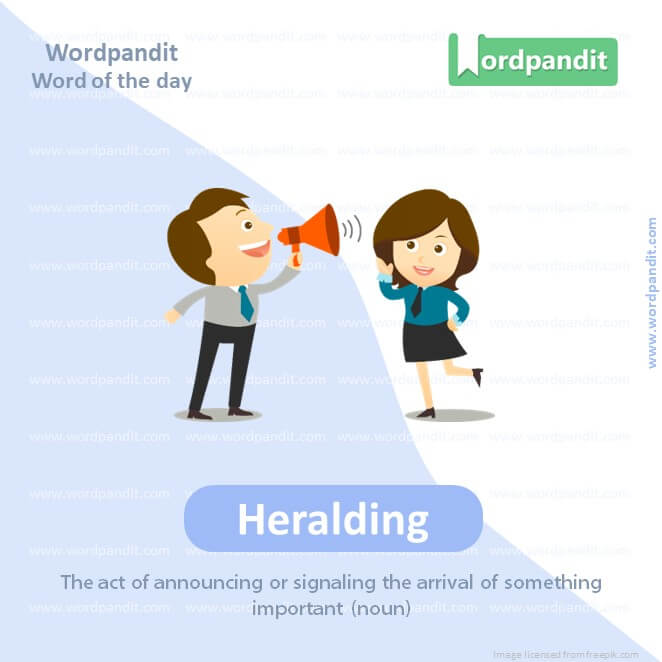
WORD-1: Heralding
CONTEXT: Having raised hopes and expectations in the LGBTQ+ community that new questions in the 2026 census meant they would finally, literally, be counted, it backtracked out of fear – fear of exposing transgender people in particular to a bigoted debate and of heralding another round of culture wars that would drown out its economic message.
SOURCE: The Guardian
EXPLANATORY PARAGRAPH: Imagine you’re playing with your friends, and one of them sees a rainbow in the sky and gets really excited, telling everyone about it. This act of excitedly telling others about something special is called “heralding.” It’s like announcing something important to everyone around you.
MEANING: The act of announcing or signaling the arrival of something important (noun).
PRONUNCIATION: HAIR-uhld-ing
SYNONYMS: Announcing, proclaiming, declaring, broadcasting, signaling, publicizing
USAGE EXAMPLES:
1. The chirping birds were heralding the arrival of spring.
2. The trumpet sounds were heralding the beginning of the parade.
3. The new policy changes were heralding a new era for the company.
4. The loud clapping was heralding the entrance of the special guest.
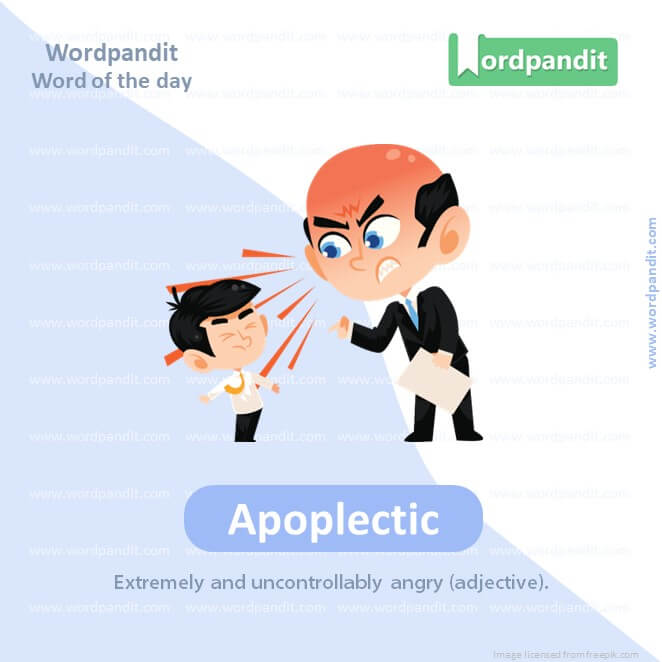
WORD-2: Apoplectic
CONTEXT: Having already been let down over the religious discrimination delay, the LGBTQ+ community was apoplectic when the planned new census questions were going the same way.
SOURCE: The Guardian
EXPLANATORY PARAGRAPH: Imagine if you are so angry that your face turns red and you can barely speak because you’re so mad. That’s what being “apoplectic” means. It’s when someone is extremely angry, almost like they can’t control how mad they are.
MEANING: Extremely and uncontrollably angry (adjective).
PRONUNCIATION: ap-uh-PLEK-tik
SYNONYMS: Furious, enraged, livid, outraged, incensed, irate
USAGE EXAMPLES:
1. She was apoplectic when she found out someone had broken her favorite toy.
2. The coach was apoplectic after the referee made a bad call.
3. He became apoplectic when his computer crashed, losing all his work.
4. The parent was apoplectic when the child ran into the street without looking.
WORD-3: Nastiness
CONTEXT: On Thursday morning, Chalmers took to ABC Radio National to say it was to prevent “nastiness” but left the door open to change, pointedly noting the census wasn’t going to be held for another two years.
SOURCE: The Guardian
EXPLANATORY PARAGRAPH: Imagine if someone said or did something that made you feel really bad or hurt your feelings. That’s called “nastiness.” It’s when people are mean or behave in a way that isn’t nice at all.
MEANING: The quality of being mean, unpleasant, or spiteful (noun).
PRONUNCIATION: NAS-tee-ness
SYNONYMS: Meanness, cruelty, spitefulness, malice, unkindness, harshness
USAGE EXAMPLES:
1. The nastiness in his words made everyone feel uncomfortable.
2. The argument turned into nastiness when they started calling each other names.
3. There was a lot of nastiness in the way she refused to share her toys.
4. His nastiness toward his classmates made him very unpopular.
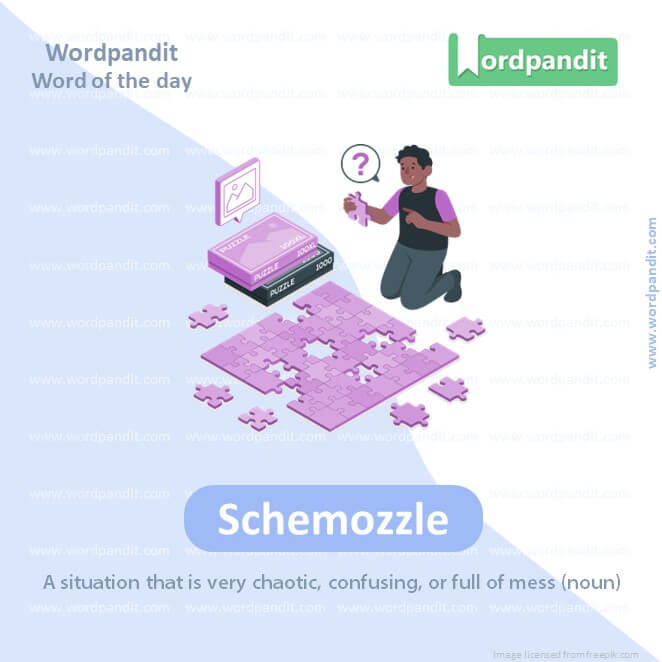
WORD-4: Schemozzle
CONTEXT: Irony may be an overused word but there are several in where the whole schemozzle wound up.
SOURCE: The Guardian
EXPLANATORY PARAGRAPH: Imagine a game where everyone is running around, bumping into each other, and everything is mixed up and confusing. That’s called a “schemozzle.” It’s when things get really chaotic and messy.
MEANING: A situation that is very chaotic, confusing, or full of mess (noun).
PRONUNCIATION: shuh-MOZ-ul
SYNONYMS: Mess, chaos, confusion, disorder, turmoil, muddle
USAGE EXAMPLES:
1. The party turned into a schemozzle when everyone started playing different games at once.
2. The schemozzle at the store happened when the sale started and everyone rushed in.
3. Cleaning up the room after the big project was a real schemozzle.
4. The meeting turned into a schemozzle when everyone began talking over each other.
WORD-5: EMULATE
CONTEXT: In the pre-Independence era, Maharashtrian freedom fighters such as Bal Gangadhar Tilak, Jyotirao Phule, and Babasaheb Ambedkar invoked the Maratha emperor to instill national pride among citizens, unite them towards the freedom cause, and emulate his actions in fighting for independence.
SOURCE: The Hindu
EXPLANATORY PARAGRAPH: Imagine if you see someone in school who is really good at drawing, and you start trying to draw just like them because you think they are so good. When you try to be like someone because you admire them, that’s called “emulate.”
MEANING: Match or surpass (a person or achievement), typically by imitation (verb).
PRONUNCIATION: EM-yoo-late
SYNONYMS: imitate, copy, mimic, mirror, echo
USAGE EXAMPLE:
1. He tried to emulate his brother’s success in sports.
2. Young artists often try to emulate their heroes.
3. She emulated the writing style of her favorite author.
4. The technology startup was looking to emulate the business model of the market leaders.
WORD-6: Bemoaned
CONTEXT: In Dr. Ambedkar’s speech at the Constituent Assembly in 1949, the Dalit leader bemoaned how Shivaji’s fight for the liberation of Hindus from Mughal rule faced hurdles because his own fellow kings – other Rajputs and Marathas – fought on the side of the Mughals.
SOURCE: The Hindu
EXPLANATORY PARAGRAPH: Imagine if your ice cream fell on the ground, and you felt really sad and kept saying how sad you are about it. When you keep talking about something sad or bad that happened, that’s called “bemoaned.”
MEANING: Express discontent or sorrow over (something) (verb).
PRONUNCIATION: bee-MOAN-d
SYNONYMS: lament, deplore, bewail, complain about, grieve over
USAGE EXAMPLE:
1. She bemoaned the fact that she had missed the concert.
2. The coach bemoaned the team’s lack of effort in the final game.
3. He often bemoaned the loss of his old car.
4. Residents bemoaned the closure of the local park.
WORD-7: Errant
CONTEXT: The Union government and the BJP leadership have shown no inclination to rein in the errant Chief Minister.
SOURCE: The Hindu
EXPLANATORY PARAGRAPH: Imagine you are supposed to stay in one place, but you wander off and go somewhere else by mistake. That’s being “errant.” It’s when something or someone goes off course or does something wrong.
MEANING: Straying from the proper course or behaving wrongly (adjective).
PRONUNCIATION: AIR-uhnt
SYNONYMS: Wandering, straying, wayward, misbehaving, delinquent, rogue
USAGE EXAMPLES:
1. The errant ball flew over the fence and into the neighbor’s yard.
2. The errant student was caught skipping class.
3. The errant sheep wandered away from the flock.
4. An errant decision led to a lot of trouble for the team.
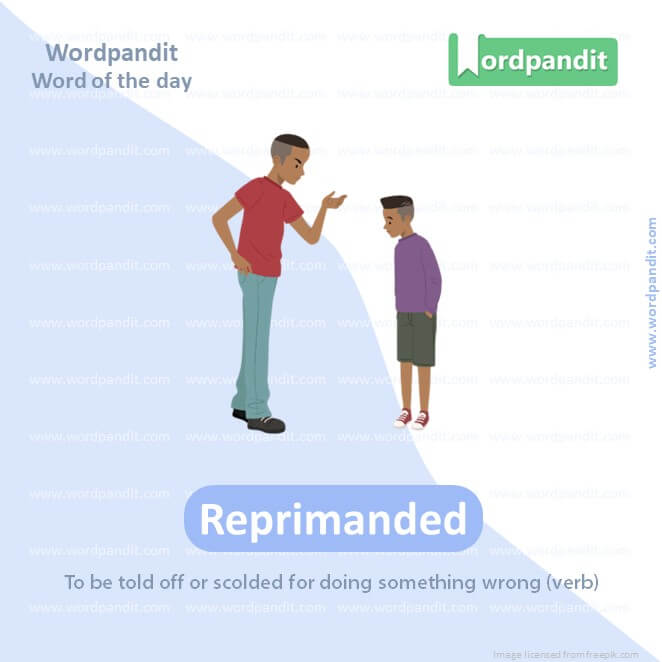
WORD-8: Reprimanded
CONTEXT: Unlike party leaders who have been reprimanded for utterances targeting sections such as farmers, Mr. Sarma uses hate speech against Muslims.
SOURCE: The Hindu
EXPLANATORY PARAGRAPH: Imagine if you did something wrong, like spilling milk on the floor, and someone told you very seriously that you should not do it again. That’s being “reprimanded.” It’s when someone is told off for doing something wrong.
MEANING: To be told off or scolded for doing something wrong (verb).
PRONUNCIATION: REP-rih-mand-ed
SYNONYMS: Scolded, rebuked, admonished, reproached, chastised, lectured
USAGE EXAMPLES:
1. The student was reprimanded for talking during the test.
2. He was reprimanded by his boss for being late to work.
3. The coach reprimanded the player for not following the game plan.
4. She was reprimanded for not cleaning up after herself.
WORD-9: Deity
CONTEXT: My ‘sanskar’ is that the first thing I did upon landing in Maharashtra today was to apologise to my revered deity.
SOURCE: The Hindu
EXPLANATORY PARAGRAPH: Imagine a very powerful and special person who can do amazing things like control the weather or make wishes come true. This kind of person is called a “deity.” A deity is like a super-powerful being that people believe in and sometimes pray to.
MEANING: A god or goddess, a divine being (noun).
PRONUNCIATION: DEE-uh-tee
SYNONYMS: God, goddess, divinity, immortal, divine being, celestial being
USAGE EXAMPLES:
1. Many ancient cultures worshiped more than one deity.
2. The statue in the temple was made to honor a deity.
3. They offered prayers to the deity for a good harvest.
4. The stories of the deity were passed down through generations.
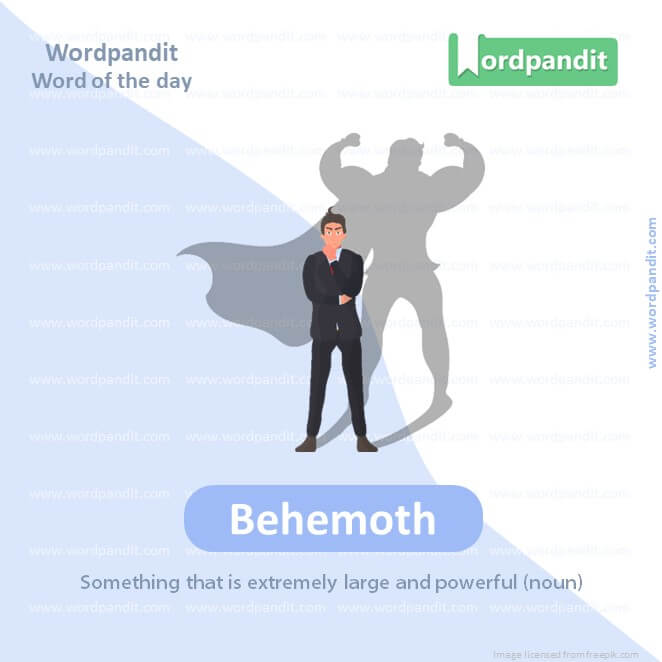
WORD-10: Behemoth
CONTEXT: They note that even though it may be very hard to compete against a behemoth like Google due to certain advantages the company naturally enjoys as the market leader, the fact remains that there are still no legal barriers against entry into the market of competitors who want to compete against Google by offering a better product.
SOURCE: The Hindu
EXPLANATORY PARAGRAPH: Imagine a huge, strong creature, like a dinosaur or a giant robot. A “behemoth” is something that is really, really big and powerful, like a company or a machine.
MEANING: Something that is extremely large and powerful (noun).
PRONUNCIATION: buh-HEE-muth
SYNONYMS: giant, colossus, mammoth, titan, monster, leviathan
USAGE EXAMPLE:
1. The tech company became a behemoth in the industry.
2. The cruise ship was a behemoth on the ocean.
3. The new shopping mall is a behemoth compared to the old one.
4. The behemoth of a machine made the work look easy.













